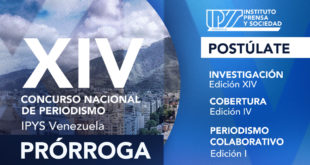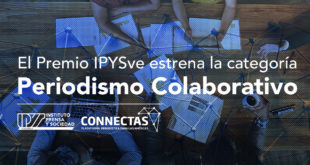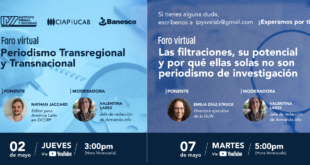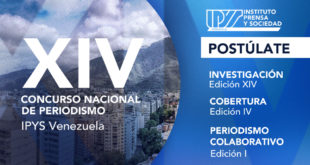El 5 de febrero de 2013, funcionarios de la Dirección de prensa y de seguridad de la Asamblea Nacional, principal órgano legislativo, impidieron el acceso de los equipos reporteriles de los medios privados a las 2 sesiones celebradas en el Palacio Federal Legislativo, ubicado en el centro de Caracas Distrito Federal.
Reporteros de varios medios privados fueron informados que no podían acceder al parlamento cuando acudieron a cubrir el homenaje que le rindiera el Estado a Noel Rodríguez, líder político del partido de Bandera Roja, torturado y desaparecido en 1973, y cuyos restos fueron localizados e identificados por el Ministerio Público, según informó la Fiscal General de la República, Luisa Ortega Díaz. Al acto asistieron representantes de los diferentes públicos.
Los funcionarios de seguridad les indicaron que el evento había sido convocado por Casa Militar, cuerpo de seguridad de la Presidencia de la República, y que solamente estaban autorizados a cubrir la actividad los equipos reporteriles del Sistema Nacional de Medios Públicos, instancia que congrega medios estatales.
Sin acreditación, sin acceso
También, los efectivos les dijeron que no podían entrar si no contaban con la acreditación de prensa, éste es un carnet que autoriza el acceso de los periodistas al parlamento, otorgado por la Dirección de Prensa de la Asamblea Nacional. Marisela Castillo, reportera de Tal Cual explicó a IPYS Venezuela que mostró las acreditaciones del Colegio Nacional de Periodistas y del Sindicato Nacional de Trabajadores de la Prensa, y el personal de seguridad alegó que éstas no eran válidas. Solamente eran aceptadas la autorización de prensa emitida por la Asamblea Nacional.
Por la información que ha podido obtener IPYS Venezuela, las acreditaciones de prensa para ingresar al ente legislativo se vencieron, y hasta la fecha no han sido renovadas, a pesar que los periodistas han entregado los recaudos requeridos. En semanas anteriores, la Dirección de Prensa solicitó a los medios que enviaran los datos de sus periodistas que cubren la fuente, para colocarlos en una lista y permitirles el acceso mientras renuevan el permiso oficial.
Hernán Lugo Galicia, representante del Colegio Nacional de Periodistas dijo a IPYS Venezuela que no se explica que para un acto especial se necesite la acreditación, debido a que se trataba de una actividad de interés para la colectividad.
Una institución pública, un acto de interés colectivo
El equipo de la planta televisiva de Globoivisión -conformado por Janelié Briceño Condado, reportera; Héctor Sánchez, camarógrafo; y Angello Rizzo, asistente- llegó al parlamento para cubrir la actividad, cerca de las 9:30 a.m., y un funcionario de seguridad, que estaba por una de las entradas del parlamento, los atendió, realizó algunas llamadas a la oficina de prensa, y luego les informó que Globovisión no estaba autorizado a cubrir el evento, debido a que sólo se habían convocado a los medios públicos. Condado, señaló a IPYS Venezuela, que ella preguntó que cuándo permitirían el ingreso de los medios privados, y el funcionario le informó que darían acceso, a partir de las 2:00 p.m, para la sesión ordinaria de la Asamblea Nacional.
Mariaeugenia Morales, reportera del diario privado El Nacional, comentó a IPYS Venezuela, que ella acudió en la mañana a la Asamblea Nacional, y una representante de prensa le informó que no podía ingresar al homenaje a Noel Rodríguez, porque era una convocatoria para medios públicos. Además, le adelantó que para la sesión de la tarde tampoco iban a tener acceso los medios privados, por decisión de la junta directiva.
Por su parte, Ingrid Bravo, reportera de Últimas Noticias; Marisela Castillo, reportera de Tal Cual; y Saúl Uzcátegui, reportero gráfico del mismo medio cuando intentaron entrar al parlamento efectivos de seguridad insistieron en retirarlos, pero ellos se oponían a salir, debido que estaban allí realizando su labor informativa sobre una actividad de interés público, según relató Castillo.
Los funcionarios de seguridad los acompañaron hasta que salieron de la sede del parlamento, y los periodistas debieron aguardar por dos horas a las afueras de la entidad legislativa, sin posibilidad de acceder a las fuentes de información. Castillo dijo que durante su permanencia al frente de la Asamblea Nacional un vigilante de seguridad estuvo observando todo lo que hacían los reporteros. También, fueron llegando otros periodistas de medios privados que tampoco pudieron entrar a cubrir el evento estatal.
Precedente
A las 4:00 p.m., iniciaría la sesión ordinaria de la Asamblea Nacional, como regularmente sucede. Los diputados de oposición tenían planteado realizar una rueda de prensa a la 1:30 p.m. en los jardines del parlamento, según los acuerdos a los que habían llegado la semana pasada, cuando dijeron que ofrecerían semanalmente declaraciones a los medios, para hablar sobre las actividades parlamentarias, debido a que el canal de la Asamblea Nacional, ANTV, no les da espacio, y existe una discriminación que preferencia a los diputados oficialistas.
Según la información recabada por IPYS Venezuela, el 29 de enero de 2013, la Dirección de prensa había advertido a los medios diciéndoles que si los diputados de oposición realizaban nuevamente su “show”, en relación a las declaraciones a los medios, iban a prohibir la entrada definitiva de los equipos reporteriles a la Asamblea. Hasta ahora, por la reforma del Reglamento de Interior y Debate de la Asamblea Nacional, los periodistas no pueden entrar a las sesiones parlamentarias. Deben cubrir las actividades, exclusivamente en una sala de prensa viendo los debates a través de la señal de ANTV, y no pueden acercarse a otros espacios del parlamento para recoger información (/alerta?id=3285).
Sesión ordinaria
Cerca de las 1:30 p.m, empezaron a llegar al parlamento otros periodistas de medios privados para cubrir, como sucede regularmente, la sesión parlamentaria. Algunos, se habían quedado luego de las limitaciones de acceso en horas de la mañana.
Morales contó a IPYS Venezuela que ella, regresó al parlamento, pese a la advertencia de la funcionaria en horas de la mañana. Pudo entrar al Palacio, y cuando iba caminando por los pasillos fue abordada por un funcionario de seguridad, quien le dijo que la actividad de la mañana no había terminado y que no podía estar en el lugar.
Por su parte, Janeth Yucra, corresponsal del diario regional Notitarde, informó a IPYS Venezuela, que cuando llegó al Palacio Federal le prohibieron la entrada al igual que a todos los periodistas de medios privados que se encontraban apostados a las afueras de la instancia legislativa.
Los equipos reporteriles que se encontraban en el sitio, de manera pacífica empezaron a protestar, y a exigir que les permitiera el acceso al parlamento, para realizar su labor informativa. Luego, alrededor de 15 diputados de oposición salieron a donde se encontraban los periodistas, rechazaron este incidente, y dijeron que conversarían en la Asamblea Nacional para solventar esta situación.
A lugar, también, acudieron representantes del Colegio Nacional de Periodistas, quienes rechazaron esta situación y exigieron a la directiva del parlamento permitir a los periodistas el acceso a la fuente.
Yucra informó que a las 3:40 p.m., Alexander Mejías, jefe de seguridad de la AN, se acercó a los periodistas y les manifestó que les permitirían el acceso a la sala de prensa de la instancia legislativa, minutos antes que comenzara la sesión.
Tinedo Guía, presidente; y Del Valle Canelón, secretaria del Colegio Nacional de Periodistas entregaron una comunicación solicitando una reunión con la junta directiva de la Asamblea para abordar las dificultades de acceso a la prensa, en esta instancia legislativa. Una representante del CNP, además, se quedó acompañando a los periodistas durante la cobertura de la sesión parlamentaria.
“Medios obligados”
Cuando inició el debate de los parlamentarios, tomó la palabra el diputado Pedro Carreño, presidente de la Comisión de Contraloría Social del parlamento y dijo que los diputados de oposición violaron el reglamento de Interior y Debate del ente legislativo, “sabiendo que hay una normativa que rige el comportamiento interno de los medios de comunicación, que se ha habilitado un ambiente con las condiciones de comodidad, para que se hagan las entrevistas. Argumento que la bancada opositora, el 29 de enero, obligó a los medios de comunicación a tomar sus declaraciones en los espacios abiertos de la Asamblea Nacional.
Esta situación evidencia las limitaciones arbitrarias de acceso de la prensa a la cobertura de asuntos públicos. Asimismo, se muestra una discriminación de los medios privados que obstaculiza la labor informativa de los equipos reporteriles.
Etiqueta: limitaciones arbitrarias a la cobertura de asuntos públicos, uso abusivo del poder estatal
__________________________________________________________________
Lea la versión en inglés
The journalists´ work of informing was hindered at the national assembly
On February 5, 2013, officials of the department of press and security of the national assembly, the principal legislative organ, prevented the access of private media reporter crews to the 2 sessions being held at the legislative federal palace, in the center of Caracas Federal district.
Reporters from several private media were informed that they could not enter the parliament building when they went to cover the homage paid by the state to Noel Rodríguez, a political leader of the Bandera Roja party, who was allegedly tortured and disappeared in 1973, and the remains of whom were found and identified by the justice department, as reported by the district attorney, Luisa Ortega Díaz. The act was attended by representatives of all public powers.
The security officials indicated that the event had been convened by the Military department, the security corps for the presidency of the republic, and that only the reporter crews from the National System of Public Media had been authorized to cover the event, an instance that gathers state-owned media.
No accreditation, no access
The guards also told them that they could not enter if they did not have the press accreditation, which is a carnet authorizing access to journalists to parliament, issued by the press department of the national assembly. Marisela Castillo, reporter at Tal Cual, explained to IPYS Venezuela that she showed her accreditation from the National College of Journalists and the National Press Workers´ Union, and the security personnel alleged that these were not valid. The only ones accepted were press passes issued by the national assembly.
Based on the information garnered by IPYS Venezuela, press accreditations to enter the legislative building have expired, and have not been renewed to date, even though the journalists have handed in the required documents. In previous weeks, the press department requested that the media send the data on the journalists covering news sources, to put them on a list and permit their access until the official permit is renewed.
Hernán Lugo Galicia, representative of the National College of Journalists told IPYS Venezuela that he cannot explain why the accreditations are needed for a specific act, since it was an activity of interest for the public at large.
A public institution, an act of collective interest
The crew of Globovisión TV station -comprising Janelié Briceño Condado, reporter; Héctor Sánchez, cameraman and Angello Rizzo, assistant- arrived at the parliament to cover the activity close to 9:30 a.m., and a security officer posted near one of the building´s entryways attended to them, made some calls to the press office and then informed them that Globovisión was not authorized to cover the event since only the public media had been called. Condado pointed out to IPYS Venezuela that she inquired when would the private media be allowed to enter, and the officer informed her that from 2:00 p.m. onwards for the regular sessions of the national assembly.
Mariaeugenia Morales, reporter at the private daily El Nacional, commented to IPYS Venezuela that she went to the national assembly in the morning, and a press rep told her she could not be present at the homage to Noel Rodríguez, because a call had been made to only the public media. She also told her that private media would not have access to the afternoon session, as per a decision made by the directors.
In turn, Ingrid Bravo, reporter at Últimas Noticias, Marisela Castillo, reporter at Tal Cual and Saúl Uzcátegui, graphic reporter of the same media recalled that when they attempted to enter the parliament building, security officers insisted in removing them, but they refused because they were there doing their work to inform on an activity of public interest, as recounted by Castillo.
The security officials escorted them out of the seat of parliament, and the journalists had to wait for two hours outside the legislative building, without access to information sources. Castillo said that during his wait in front of the national assembly a security officer observed everything the reporters were doing. Other journalists from private media also arrived and could not enter to cover the state event.
Precedent
The regular sessions of the national assembly were to start at 4:00 p.m., as is customary. The opposition congressmen had planned to hold a press conference at 1:30 p.m. in the gardens of the parliament building, according to an agreement reached last week, when they stated they would offer weekly statements to the media to talk about parliamentary activities since the ANTV, the TV channel for the national assembly, gives them no space to do so, and it discriminates and gives preference to official party congressmen.
Based on the information collected by IPYS Venezuela, on January 29, 2013, the press department had warned the media saying that if the opposition congressmen once again did their “show” -declaring to the media- they would definitively ban the entry of reporter crews to the assembly meetings. So far, due to the amendment to the national assembly´s internal and debate regulations, journalists cannot enter during parliament sessions. They must cover the activities exclusively in a press room, watching the debates through the ANTV signal, and are banned from approaching other parliament spaces to obtain information (/alerta?id=3285).
Regular Sessions
Close to 1:30 p.m., other journalists from private media started to arrive to the parliament building to cover the parliament sessions as is customary. Some had stayed since the morning despite the access limitations.
Morales told IPYS Venezuela that she returned to the parliament building, despite the official´s warning in the morning. She was able to enter the palace, and when she was walking the hallway she was approached by a security officer, who told her that the morning´s session had not concluded and that she could not be in the premises.
In turn, Janeth Yucra, correspondent of regional newspaper Notitarde, informed IPYS Venezuela that when she arrived at the federal palace she was not allowed to enter, just like all the other journalists from private media which were outside the legislative instance.
The reporter crews on site started to protest peacefully and request access to parliament to do their job. Later, close to 15 opposition congressmen went out to find the journalists, denounced this incident, and said they would discuss this situation to find a solution at the national assembly.
Representatives of the National College of Journalists also arrived, and repealed this situation and demanded that the directors of parliament permit the journalists to have access to the news sources.
Yucra informed that at 3:40 p.m. Alexander Mejías, the national assembly´s head of security, approached the journalists and told them they would have access to the legislative building´s press room a few minutes prior to the start of the session.
Tinedo Guía, president and Del Valle Canelón, secretary of the National College of Journalists, handed in a communiqué requesting a meeting with the board of directors of the national assembly to discuss the difficulties of access against the press to this legislative building. A representative of the CNP also accompanied the journalists during the cover of the parliamentary session.
“Media forced”
When the parliamentary debate commenced, the floor was given to congressman Pedro Carreño, chair of the parliament´s social comptrollership commission, who stated that the opposition congressmen violated the legislative entity´s internal and debate regulations, “knowing there is a set of rules regulating the behavior of the media inside these sessions, that a room with comfortable conditions had been made available for the interviews to take place in¨, arguing that the opposition forced the media on January 29 to take his statement in the open spaces of the national assembly.
This situation is evidence of the arbitrary access limitations to the press on the coverage of public affairs. It also shows discrimination against private media, hindering the reporter crews´ work of informing the population.
Label: arbitrary limitations to the coverage of public affairs, abusive use of the state´s power
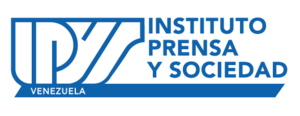 IPYS Instituto Prensa y Sociedad Venezuela
IPYS Instituto Prensa y Sociedad Venezuela
